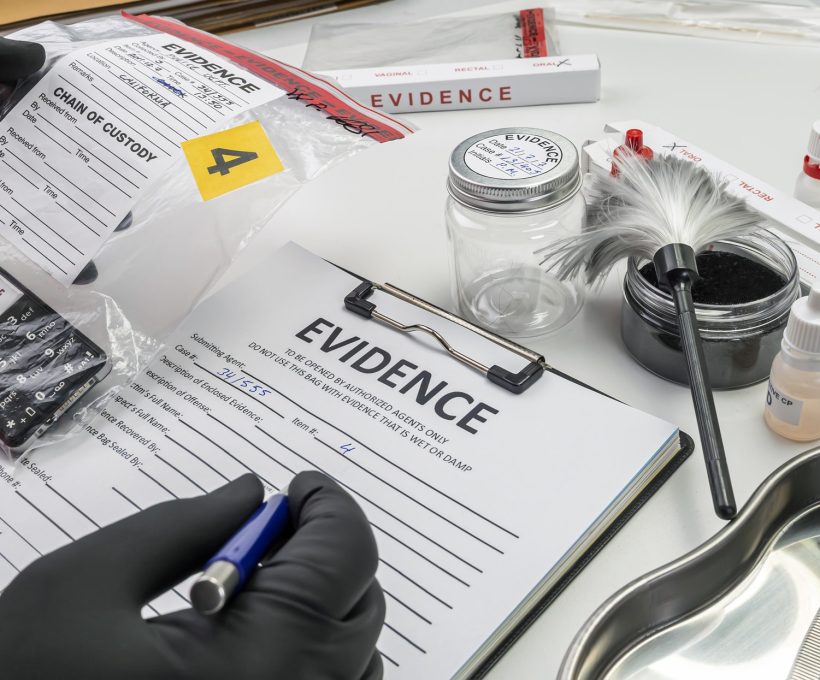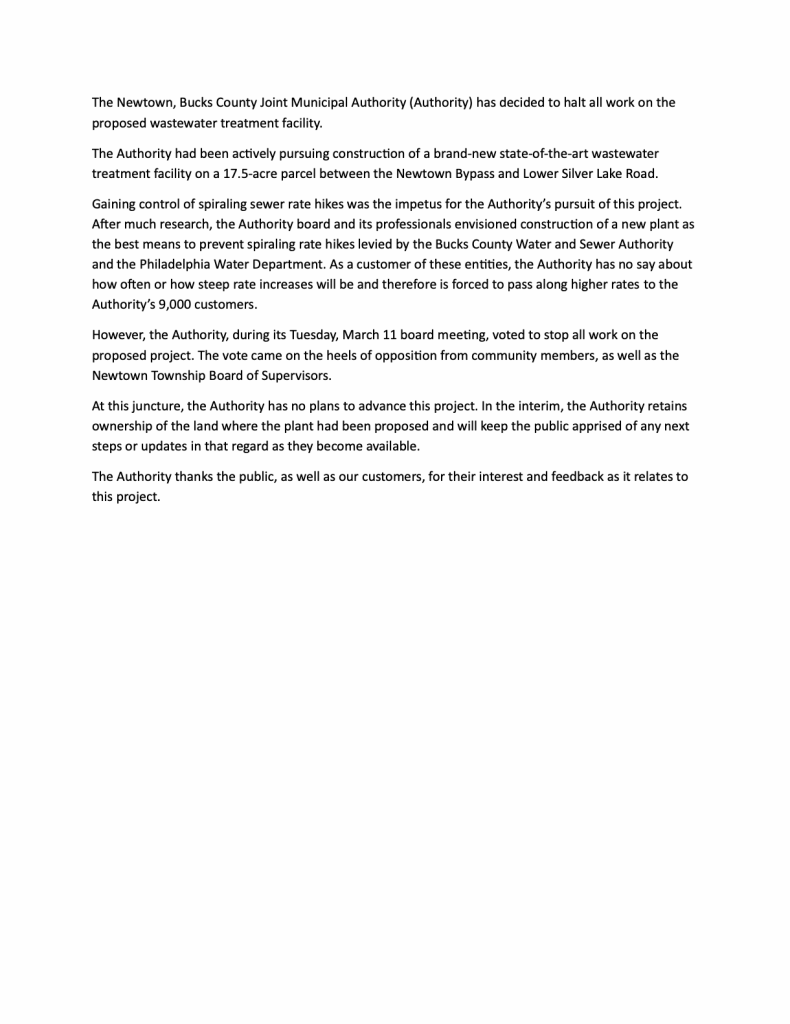
Wastewater Treatment Plant Project
Enhancing Our Infrastructure: The Future of Wastewater Treatment
Wastewater Treatment Plant Project
The Newtown, Bucks County Joint Municipal Authority (Authority) is actively pursuing construction of our own wastewater treatment facility.
The Authority recently acquired a 17.5-acre parcel between the Newtown Bypass and Lower Silver Lake Road as a future site for a brand-new wastewater treatment plant.
The plant, once constructed, would be virtually invisible from the bypass.
We will keep our customers and community apprised of updates as progress continues. Rates will increase in January from $82 to $120.54 per quarter for the 10,000 gallon minimum, which equates to a less than 43 cents per day increase. Frequently Asked Questions posted on our website may help to address any concerns our customers have. Those can be accessed at Wastewater Treatment Plant Project FAQ.
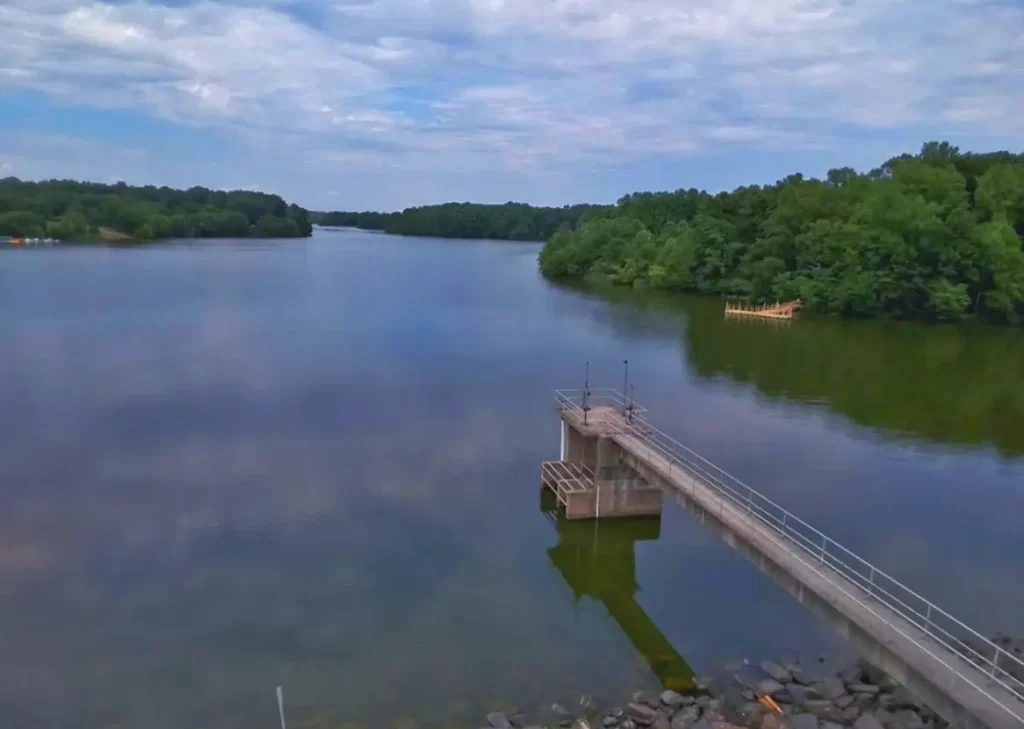
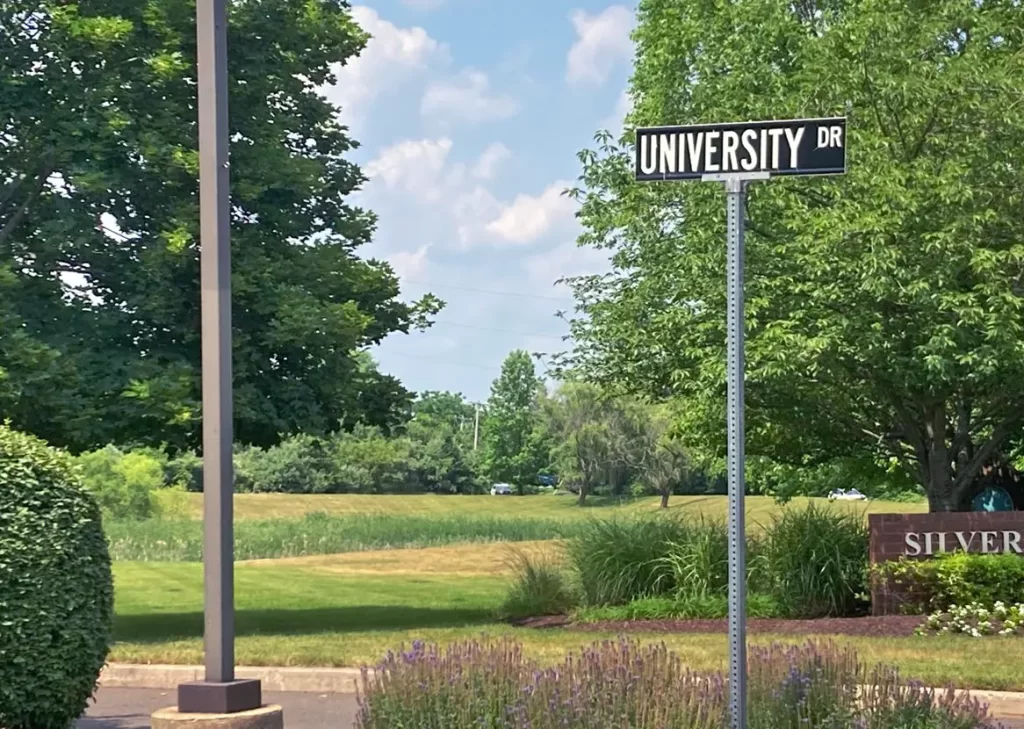
The impetus for undertaking construction and operation of our own wastewater treatment plant centers around a failed attempt by the Bucks County Water and Sewer Authority (BCWSA) to sell its sewer assets to Aqua Pennsylvania, a private company, for a whopping $1.1 billion. Neighboring public authorities that sold their systems to for-profit companies saw skyrocketing water and sewer rate increases. As a wholesale customer of BCWSA, future spiraling rates would have had a trickle down effect on our
customers — you.
In 2023, BCWSA instituted the first of three planned rate increases for its wholesale customers, which amounted to a 16.6 percent rate hike, an increase, that we, unfortunately, had to pass on to our customers along with a nominal 3.4 percent increase to cover the normal growth in Authority operating costs in an inflationary environment. It is not known how much BCWSA will charge for subsequent rate increases as these decisions are often made with little, if any, input from our Authority or board.
While we are grateful that the BCWSA sale did not move forward, in its absence BCWSA is left with a laundry list of expensive upgrades and maintenance that were long overdue. As a wholesale customer of BCWSA, our Authority must contribute shared costs of multi-million-dollar infrastructure upgrades and maintenance to the Neshaminy Interceptor system.
Our Authority board realized that unless we took steps to become independent of the Bucks County Water and Sewer Authority, we would always be subject to their decisions and rate hikes, causing our residents to be perpetual subjects to higher expenses that we could not control. We decided to investigate the possibility of taking full dominion over our future sewer needs by building our own plant.
Our Authority will work to ensure that the advanced technology we envision for the plant addresses any potential concerns from residents.
We will continue our due diligence with all the necessary parties as this project moves to fruition.
So far, the Pennsylvania Department of Environmental Protection has indicated it supports the concept.
Our elected leaders in Newtown Township and Newtown Borough are interested in protecting our residents and saving money, and our engineers tell us that the project is feasible.
As this evolves, we will keep the community informed of our progress.
Frequently Asked Questions
Welcome to the NBCJMA Wastewater Treatment Plant Project FAQ page! Here, you’ll find answers to common questions about our ongoing treatment plant improvements, including project scope, timeline, benefits, and potential impacts. This project is essential for maintaining reliable wastewater management and ensuring compliance with environmental regulations.
If you don’t see your question answered here, feel free to contact our office—we’re happy to provide more information!
The Authority no longer operates a wastewater treatment plant. NBCJMA closed its facility in 1988. At the time, the PADEP was a proponent of regionalization and at the time it was considerably less expensive for the Authority to become a wholesale customer of the Bucks County Water and Sewer Authority (BCWSA) and discharge wastewater through the BCWSA Neshaminy Interceptor for treatment in Philadelphia.
The Authority no longer operates a wastewater treatment plant. NBCJMA closed its facility in 1988. At the time, the PADEP was a proponent of regionalization and at the time it was considerably less expensive for the Authority to become a wholesale customer of the Bucks County Water and Sewer Authority (BCWSA) and discharge wastewater through the BCWSA Neshaminy Interceptor for treatment in Philadelphia.
In 2023, BCWSA instituted the first of three planned rate increases for its wholesale customers, which amounted to a 16.6 percent rate hike, an increase, that we, unfortunately, had to pass on to our customers along with a nominal 3.4 percent increase to cover the normal growth in Authority operating costs in an inflationary environment. We do not yet know the full impact of subsequent BCWSA increases, but our board is anticipating more double-digit levies. In addition, as treatment plant upgrades and long-term control plans are needed by the City of Philadelphia, we foresee additional uncontrollable rate increases from that entity as well. As was the case in 1988 when we terminated our plant operations, the NBCJMA board remains committed to keeping our customers’ rates as low as possible. Operating our own treatment plant will provide our Authority with better oversight to properly plan and budget for necessary repairs and maintenance, while maintaining competitive, self-controlled rates.
The Authority plans to construct a state-of-the-art plant with a minimum 30-year lifespan. This cutting-edge technology effectively removes 98% of solids, ensuring that residue is not distributed throughout the plant and therefore ensures better affluency. Given the high-quality technology used in its construction and operation, the Authority is confident that the plant will require less maintenance over the long term.
NBCJMA’s current flows are 2 million gallons per day. The new wastewater treatment plant will have a 2.5 million gallons per day capacity with the potential to expand to address the community’s future wastewater needs.
NBCJMA is NOT considering selling its sewer assets to a public company or other entity. In order to keep rates as low as possible, it’s important for our system to be publicly owned. Our board is made up of ratepayers who are committed to best serving the public, rather than stockholders seeking to make profits. Even with the most recent 20% rate increase from BCWSA, our customers pay $82 per quarter for the first 10,000 gallons. Since Lower Makefield’s sewer system was purchased, their customers now pay $204.18 per quarter – nearly 250% more than our customers – for the first 10,000 gallons.
The Authority recently acquired a 17.5-acre parcel between the Newtown Bypass and Lower Silver Lake Road as a future site for a brand-new wastewater treatment plant. Our board will ensure plenty of distance from residences, as well as additional buffering.
Given the local and state approval needed for this project, as well as the need to complete building renderings, a cost analysis and construction, we anticipate the plant being constructed and operational within five to seven years.
The Authority plans to issue municipal bonds or other bank borrowing, which would be repaid over a specific number of years, to cover the cost of the project. Since the Authority currently has no long-term debt, our financial professionals see no issue with borrowing for this long-term project. This is the typical way all communities finance major capital projects and has been used for decades.
In an effort to provide the utmost transparency throughout this process, the Authority is beginning its outreach to customers in these early stages and will continue to provide updates as this project evolves.
For 2025, the Authority projects an increase in rates from $82 to $120.54 per quarter for the 10,000 gallon minimum, which equates to less than 43 cents per day for an average billing quarter.
The Authority’s projected rate increases are in line with, and in most cases less costly than what customers in neighboring municipalities are currently paying. Northampton, Bucks County Joint Municipal Authority, for instance, charges $93.75 per month for 7,000 gallons and Pennsylvania American Water charges a flat fee of $106 monthly per equivalent dwelling unit. Meanwhile, our Authority anticipates $120.54 per quarter beginning in 2025, which amounts to an increase that is less than 43 cents per day. While future rate modifications are inevitable due to funding needed to build the new wastewater treatment plant, our Authority board is comprised of customers just like you. As such, we will work diligently to manage the impact of future rate increases in conjunction with the new wastewater treatment plant and beyond.
Project Gallery
Coming Soon!
Project Gallery

March 17th, 2025 Statement on Wastewater Treatment Plant
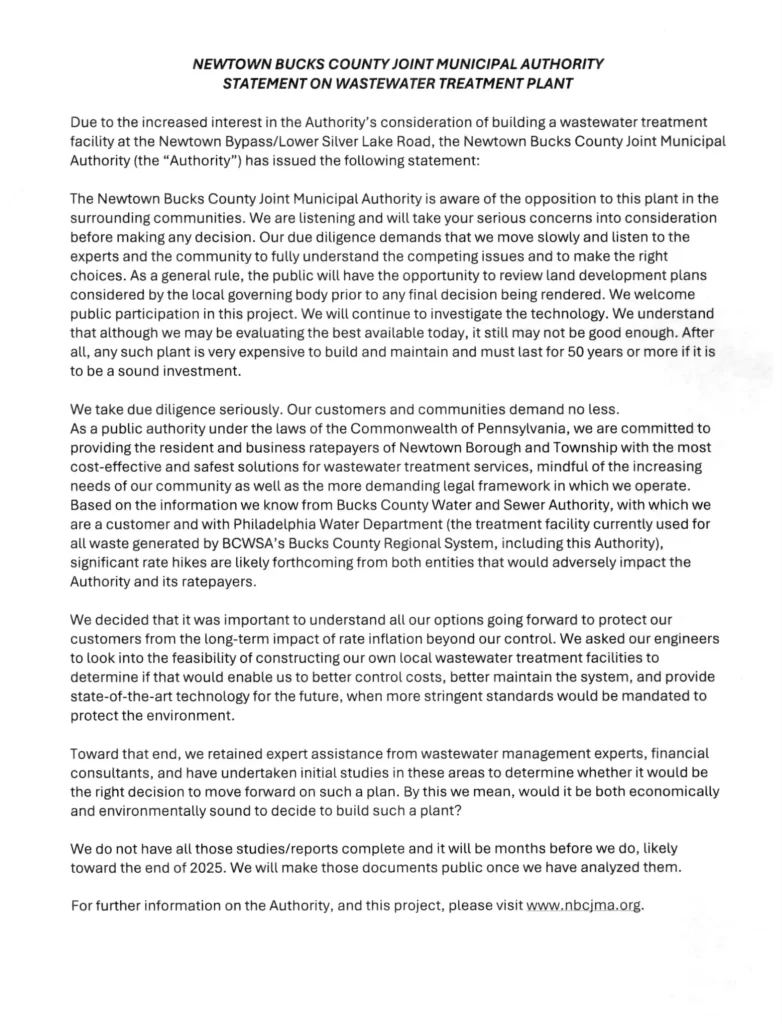
Newtown Bucks County Joint Municipal Authority Statement on Wastewater Treatment Plant
Need Consultancy, Request A Free Quote
Lorem ipsum dolor sit amet, consectetur adipiscing elit, sed do eiusmod tempor incididunt ut labore et dolore

Constution and Law
Lorem ipsum dolor sit amet, consectetur adipiscing elit, sed do eiusmod tempor incididunt ut labore et dolore magna aliqua. Ut enim ad minim veniam, quis nostrud exercitation ulla laboris nisi ut aliquip ex ea commodo consequat. Duis aute irure dolor in reprehe in volup velit esse cillum dolore eu fugiat nulla pariatur. Excepteur sint occaecat cupidatat non proident, sunt in culpa qui officia deserunt mollit anim id est laborum
Lorem ipsum dolor sit amet, consectetur adipiscing elit, sed do eiusmod tempor incididunt ut labore et dolore magna aliqua. Ut enim ad minim veniam, quis nostrud exercitation ulla laboris nisi ut aliquip ex ea commodo consequat.
Lates Cases
Lorem ipsum dolor sit amet, consectetur adipiscing elit, sed do eiusmod tempor incididunt ut labore et dolore magna aliqua. Ut enim ad minim veniam, quis nostrud exercitation ulla laboris nisi ut aliquip ex ea commodo consequat.
Lorem ipsum dolor sit amet, consectetur adipiscing elit, sed do eiusmod tempor incididunt ut labore et dolore magna aliqua. Ut enim ad minim veniam, quis nostrud exercitation ulla laboris nisi ut aliquip ex ea commodo consequat. Duis aute irure dolor in reprehenderit in voluptate velit esse cillum dolore eu fugiat nulla pariatur.
Consectetur adipiscing elit, sed do eiusmod tempor incididunt ut labore et dolore magna aliqua. Ut enim ad minim veniam, quis nostrud exercitation ulla laboris nisi ut aliquip ex ea commodo consequat. Duis aute irure dolor in reprehe in volup velit esse cillum dolore eu fugiat nulla pariatur. Excepteur sint occaecat cupidatat non proident, sunt in culpa qui officia deserunt mollit anim id est laborum


